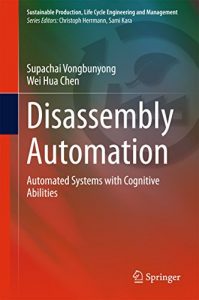I 99eBooks è una directory di eBook. Cerchiamo e classificato intorno alle eBooks Web per te!
Tutti i diritti riservati. I libri e libri elettronici sono di proprietà dei rispettivi proprietari.
Disassembly Automation: Automated Systems with Cognitive Abilities (Sustainable Production, Life Cycle Engineering and Management)
This book presents a number of aspects to be considered in the development of disassembly automation, including the mechanical system, vision system and intelligent planner. The implementation of cognitive robotics increases the flexibility and degree of autonomy of the disassembly system. Disassembly, as a step in the treatment of end-of-life products, can allow the recovery of embodied value left within disposed products, as well as the appropriate separation of potentially-hazardous components. In the end-of-life treatment industry, disassembly has largely been limited to manual labor, which is expensive in developed countries. Automation is one possible solution for economic feasibility. The target audience primarily comprises researchers and experts in the field, but the book may also be beneficial for graduate students.

















